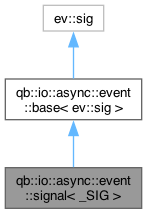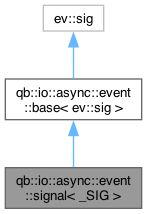|
qb
2.0.0.0
C++17 Actor Framework
|
|
qb
2.0.0.0
C++17 Actor Framework
|
Event for handling system signals asynchronously. More...
#include <signal.h>


Public Types | |
| using | base_t = base<ev::sig> |
| Base type alias for base<ev::sig>. | |
| Public Types inherited from qb::io::async::event::base< ev::sig > | |
| using | ev_t |
| Alias for the underlying libev event watcher type. | |
Public Member Functions | |
| signal (ev::loop_ref loop) | |
| Constructor. | |
| Public Member Functions inherited from qb::io::async::event::base< ev::sig > | |
| base (ev::loop_ref loop) | |
| Constructor. | |
Additional Inherited Members | |
| Public Attributes inherited from qb::io::async::event::base< ev::sig > | |
| IRegisteredKernelEvent * | _interface |
| Pointer to the kernel event interface responsible for handling this event. | |
| int | _revents |
| Stores the event flags (e.g., EV_READ, EV_WRITE) received from libev when the event triggers. | |
Event for handling system signals asynchronously.
This template class extends qb::io::async::event::base<ev::sig> and thus wraps an ev::sig watcher from libev. It is used to watch for specific system signals (e.g., SIGINT, SIGTERM) and trigger callbacks when they occur. The signal to watch is typically specified as a template parameter.
| _SIG | The signal number to watch (e.g., SIGINT, SIGTERM). If -1 (the default for the specialized version), the signal number must be set dynamically using the set() method of the underlying ev::sig watcher. |
Usage Example:
|
inlineexplicit |
Constructor.
Creates a signal watcher for the specified signal number (if provided as template argument).
| loop | Reference to the libev event loop (ev::loop_ref) this watcher will be associated with. |